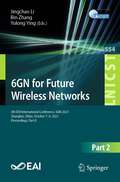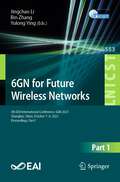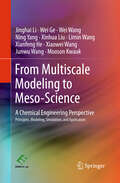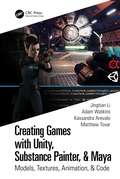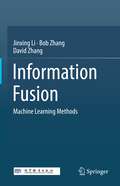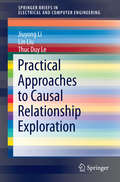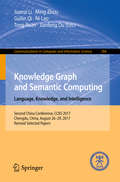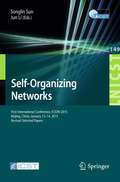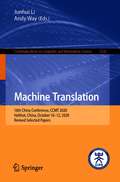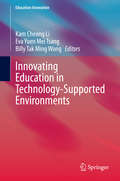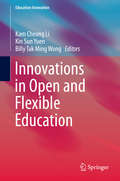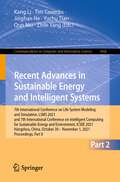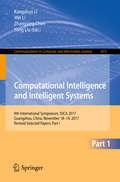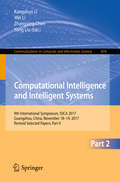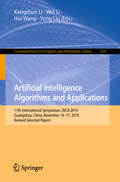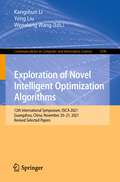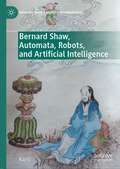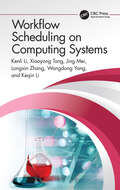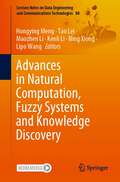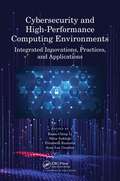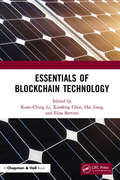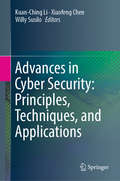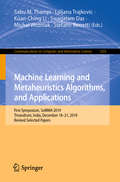- Table View
- List View
6GN for Future Wireless Networks: 6th EAI International Conference, 6GN 2023, Shanghai, China, October 7-8, 2023, Proceedings, Part II (Lecture Notes of the Institute for Computer Sciences, Social Informatics and Telecommunications Engineering #554)
by Jingchao Li Bin Zhang Yulong YingThis 2-volume set constitutes the proceedings of the 6th EAI International Conference on 6GN for Future Wireless Networks, 6GN 2023, held in Shanghai, China, in October 7-8, 2023.The 60 full papers were selected from 151 submissions and present the state of the art and practical applications of 6G technologies. The papers are arranged thematically in tracks as follows: intelligent systems; big data mining, D2D communication, security and privacy for 6G networks; artificial intelligent techniques for 6G networks; power and energy systems I; power and energy system; power and energy systems; image, video, and signal processing; image, video, and signal processing & software engineering; communications systems and networking & control and automation systems; computer systems and applications.
6GN for Future Wireless Networks: 6th EAI International Conference, 6GN 2023, Shanghai, China, October 7-8, 2023, Proceedings, Part I (Lecture Notes of the Institute for Computer Sciences, Social Informatics and Telecommunications Engineering #553)
by Jingchao Li Bin Zhang Yulong YingThis 2-volume set constitutes the proceedings of the 6th EAI International Conference on 6GN for Future Wireless Networks, 6GN 2023, held in Shanghai, China, in October 7-8, 2023. The 60 full papers were selected from 151 submissions and present the state of the art and practical applications of 6G technologies. The papers are arranged thematically in tracks as follows: intelligent systems; big data mining, D2D communication, security and privacy for 6G networks; artificial intelligent techniques for 6G networks; power and energy systems I; power and energy system; power and energy systems; image, video, and signal processing; image, video, and signal processing & software engineering; communications systems and networking & control and automation systems; computer systems and applications.
From Multiscale Modeling to Meso-Science
by Jinghai Li Junwu Wang Limin Wang Mooson Kwauk Ning Yang Wei Ge Wei Wang Xianfeng He Xiaowei Wang Xinhua LiuMultiscale modeling is becoming essential for accurate, rapid simulation in science and engineering. This book presents the results of three decades of research on multiscale modeling in process engineering from principles to application, and its generalization for different fields. This book considers the universality of meso-scale phenomena for the first time, and provides insight into the emerging discipline that unifies them, meso-science, as well as new perspectives for virtual process engineering. Multiscale modeling is applied in areas including: multiphase flow and fluid dynamicschemical, biochemical and process engineeringmineral processing and metallurgical engineeringenergy and resourcesmaterials science and engineeringJinghai Li is Vice-President of the Chinese Academy of Sciences (CAS), a professor at the Institute of Process Engineering, CAS, and leader of the EMMS (Energy-minimizing multiscale) Group. Wei Ge, Wei Wang, Ning Yang and Junwu Wang are professors at the EMMS Group, part of the Institute of Process Engineering, CAS. Xinhua Liu, Limin Wang, Xianfeng He and Xiaowei Wang are associate professors at the EMMS Group, part of the Institute of Process Engineering, CAS. Mooson Kwauk is an emeritus director of the Institute of Process Engineering, CAS, and is an advisor to the EMMS Group.
Creating Games with Unity, Substance Painter, & Maya: Models, Textures, Animation, & Code
by Jingtian Li Adam Watkins Kassandra Arevalo Matthew TovarThis tutorial-based book allows readers to create a first-person game from start to finish using industry-standard (and free to student) tools of Unity, Substance Painter, and Maya. The first half of the book lays out the basics of using Maya and Substance Painter to create game-ready assets. This includes polygonal modeling, UV layout, and custom texture painting. The book then covers rigging and animation solutions to create assets to be placed in the game, including animated first-person assets and motion-captured NPC animations. Finally, readers can put it all together and build interactivity that allows the player to create a finished game using the assets built and animated earlier in the book. • Written by industry professionals with real-world experience in building assets and games • Build a complete game from start to finish • Learn what the pros use: construct all assets using the tools used at game studios across the world • All software used are free to students • When complete, students will have a playable version of an FPS game Jingtian Li is a graduate of China’s Central Academy of Fine Arts and New York’s School of Visual Arts, where he earned an MFA in Computer Art. He currently is an Assistant Professor of 3D Animation & Game Design at the University of the Incarnate Word in San Antonio, Texas. Adam Watkins is a 20-year veteran of 3D education. He holds an MFA in 3D Animation and a BFA in Theatre Arts from Utah State University. He currently is the Coordinator and Professor of the 3D Animation & Game Department at the University of the Incarnate Word in San Antonio, Texas. Kassandra Arevalo is an instructor of 3D Animation & Game Design at the University of the Incarnate Word in San Antonio, Texas. She previously worked as an animator at Immersed Games. Matt Tovar is an industry veteran animator. He has worked at Naughty Dog, Infinity Ward, and Sony Interactive on such games as The Last of Us, Call of Duty: Modern Warfare, and most recently Marvel’s Avengers with Crystal Dynamics. He is an Assistant Professor of 3D Animation at the University of the Incarnate Word in San Antonio, Texas.
Information Fusion: Machine Learning Methods
by Jinxing Li Bob Zhang David ZhangIn the big data era, increasing information can be extracted from the same source object or scene. For instance, a person can be verified based on their fingerprint, palm print, or iris information, and a given image can be represented by various types of features, including its texture, color, shape, etc. These multiple types of data extracted from a single object are called multi-view, multi-modal or multi-feature data. Many works have demonstrated that the utilization of all available information at multiple abstraction levels (measurements, features, decisions) helps to obtain more complex, reliable and accurate information and to maximize performance in a range of applications.This book provides an overview of information fusion technologies, state-of-the-art techniques and their applications. It covers a variety of essential information fusion methods based on different techniques, including sparse/collaborative representation, kernel strategy, Bayesian models, metric learning, weight/classifier methods, and deep learning. The typical applications of these proposed fusion approaches are also presented, including image classification, domain adaptation, disease detection, image restoration, etc. This book will benefit all researchers, professionals and graduate students in the fields of computer vision, pattern recognition, biometrics applications, etc. Furthermore, it offers a valuable resource for interdisciplinary research.
Practical Approaches to Causal Relationship Exploration
by Jiuyong Li Lin Liu Thuc Duy LeThis brief presents four practical methods to effectively explore causal relationships, which are often used for explanation, prediction and decision making in medicine, epidemiology, biology, economics, physics and social sciences. The first two methods apply conditional independence tests for causal discovery. The last two methods employ association rule mining for efficient causal hypothesis generation, and a partial association test and retrospective cohort study for validating the hypotheses. All four methods are innovative and effective in identifying potential causal relationships around a given target, and each has its own strength and weakness. For each method, a software tool is provided along with examples demonstrating its use. Practical Approaches to Causal Relationship Exploration is designed for researchers and practitioners working in the areas of artificial intelligence, machine learning, data mining, and biomedical research. The material also benefits advanced students interested in causal relationship discovery.
LDPC Code Designs, Constructions, and Unification
by Juane Li Shu Lin Khaled Abdel-Ghaffar William E. Ryan Daniel J. CostelloWritten by leading experts, this self-contained text provides systematic coverage of LDPC codes and their construction techniques, unifying both algebraic- and graph-based approaches into a single theoretical framework (the superposition construction). An algebraic method for constructing protograph LDPC codes is described, and entirely new codes and techniques are presented. These include a new class of LDPC codes with doubly quasi-cyclic structure, as well as algebraic methods for constructing spatially and globally coupled LDPC codes. Authoritative, yet written using accessible language, this text is essential reading for electrical engineers, computer scientists and mathematicians working in communications and information theory.
Knowledge Graph and Semantic Computing. Language, Knowledge, and Intelligence
by Juanzi Li Ming Zhou Guilin Qi Ni Lao Tong Ruan Jianfeng DuThis book constitutes the refereed proceedings of the Second China Conference on Knowledge Graph and Semantic Computing, CCKS 2017, held in Chengdu, China, in August 2017. The 11 revised full papers and 6 revised short papers presented were carefully reviewed and selected from 85 submissions. The papers cover wide research fields including the knowledge graph, the Semantic Web, linked data, NLP, knowledge representation, graph databases.
Self-Organizing Networks
by Jun Li Songlin SunThis book constitutes the thoroughly refereed post-conference proceedings of the International ICST Conference on Self-Organizing Networks, ICSON 2015, held in January 2015 in Beijing, China. The 20 revised full papers presented were carefully reviewed and selected from 24 submissions and cover topics as resource allocation and management, signal processing and transmission, and multimedia service
Machine Translation: 16th China Conference, CCMT 2020, Hohhot, China, October 10-12, 2020, Revised Selected Papers (Communications in Computer and Information Science #1328)
by Junhui Li Andy WayThis book constitutes the refereed proceedings of the 16th China Conference on Machine Translation, CCMT 2020, held in Hohhot, China, in October 2020. The 13 papers presented in this volume were carefully reviewed and selected from 78 submissions and focus on all aspects of machine translation, including preprocessing, neural machine translation models, hybrid model, evaluation method, and post-editing.
OFDMA Mobile Broadband Communications
by Junyi Li Xinzhou Wu Rajiv LaroiaWritten by the pioneers of Flash-OFDM, arguably the first commercially developed OFDMA-based mobile broadband system in the world, this book teaches OFDMA from first principles, enabling readers to understand mobile broadband as a whole. The book examines the key requirements for data-centric mobile; how OFDMA fits well with data networks; why mobile broadband needs to be IP-based; and how to bridge communications theory to real-world air interface design and make a good system choice between performance and complexity. It also explores the future of wireless technologies beyond conventional cellular architecture. One of the key challenges faced by newcomers to this field is how to apply the wireless communications theory and principles to the real world and how to understand sophisticated commercial systems such as LTE. The authors use their firsthand experience to help graduate students, researchers and professionals working on 4G to bridge the gap between theory and practice.
Innovating Education in Technology-Supported Environments (Education Innovation Series)
by Kam Cheong Li Billy Tak Ming Wong Eva Yuen Mei TsangThis book explores a broad range of innovations in education, such as flipped classrooms, the educational use of social media, mobile learning and educational resources. It also includes theoretical discussions and practical applications related to the use of augmented reality and educational technologies for improving students’ engagement and facilitating their future studies and careers. Featuring case studies and practical applications illustrating the effectiveness of new modes of education in which the latest technologies and innovations are widely used in the global context, the book helps readers develop their awareness of the related insights and implications, in order to deepen their understanding and stimulate critical thinking as to how new technologies have made learning and teaching easier in different educational settings.
Innovations in Open and Flexible Education (Education Innovation Series)
by Kam Cheong Li Kin Sun Yuen Billy Tak WongThis book covers a broad range of innovations in education, such as flipped classrooms, the educational use of social media, mobile learning, educational resources and massive open online courses, as well as theoretical discussions and practical applications in the use of augmented reality and educational technology to improve student engagement and pave the way for students’ future studies and careers. The case studies and practical applications presented here illustrate the effectiveness of new modes of education in which the latest technologies and innovations are widely used in the global context. Accordingly, the book can help develop readers’ awareness of the potential these innovations hold, thus expanding their expertise and stimulating critical thinking as to how new technologies have made learning and teaching easier in various educational settings.
Recent Advances in Sustainable Energy and Intelligent Systems: 7th International Conference on Life System Modeling and Simulation, LSMS 2021 and 7th International Conference on Intelligent Computing for Sustainable Energy and Environment, ICSEE 2021, Hangzhou, China, October 30 – November 1, 2021, Proceedings, Part II (Communications in Computer and Information Science #1468)
by Kang Li Tim Coombs Jinghan He Yuchu Tian Qun Niu Zhile YangThe three-volume set CCIS 1467, CCIS 1468, and CCIS 1469 constitutes the thoroughly refereed proceedings of the 7th International Conference on Life System Modeling and Simulation, LSMS 2021, and of the 7th International Conference on Intelligent Computing for Sustainable Energy and Environment, ICSEE 2021, held in Hangzhou, China, in October 2021. The 159 revised papers presented were carefully reviewed and selected from over 430 submissions.The papers of this volume are organized in topical sections on: Medical Imaging and Analysis Using Intelligence Computing; Biomedical signal processing, imaging, visualization and surgical robotics; Computational method in taxonomy study and neural dynamics; Intelligent medical apparatus, clinical applications and intelligent design of biochips; Power and Energy Systems; Computational Intelligence in Utilization of Clean and Renewable Energy Resources, and Intelligent Modelling, Control and Supervision for Energy Saving and Pollution Reduction; Intelligent Methods in Developing Electric Vehicles, Engines and Equipment; Intelligent Control Methods in Energy Infrastructure Development and Distributed Power Generation Systems; Intelligent Modeling, Simulation and Control of Power Electronics and Power Networks; Intelligent Techniques for Sustainable Energy and Green Built Environment, Water Treatment and Waste Management; Intelligent Robot and Simulation; Intelligent Data Processing, Analysis and Control in Complex Systems; Advanced Neural Network Theory and Algorithms; Advanced Computational Methods and Applications; Fuzzy, Neural, and Fuzzy-neuro Hybrids; Intelligent Modelling, Monitoring, and Control of Complex Nonlinear Systems; Intelligent manufacturing, autonomous systems, intelligent robotic systems; Computational Intelligence and Applications.
Computational Intelligence and Intelligent Systems: 9th International Symposium, ISICA 2017, Guangzhou, China, November 18–19, 2017, Revised Selected Papers, Part I (Communications in Computer and Information Science #873)
by Kangshun Li Wei Li Zhangxing Chen Yong LiuThis two-volume set (CCIS 873 and CCIS 874) constitutes the thoroughly refereed proceedings of the 9th International Symposium, ISICA 2017, held in Guangzhou, China, in November 2017.The 101 full papers presented in both volumes were carefully reviewed and selected from 181 submissions. This first volume is organized in topical sections on neural networks and statistical learning: neural architecture search, transfer of knowledge; evolutionary multi-objective and dynamic optimization: optimal control and design, hybrid methods; data mining: association rule learning, data management platforms; Cloud computing and multiagent systems: service models, Cloud engineering; everywhere connectivity: IoT solutions, wireless sensor networks.
Computational Intelligence and Intelligent Systems: 9th International Symposium, ISICA 2017, Guangzhou, China, November 18–19, 2017, Revised Selected Papers, Part II (Communications in Computer and Information Science #874)
by Kangshun Li Wei Li Zhangxing Chen Yong LiuThis two-volume set (CCIS 873 and CCIS 874) constitutes the thoroughly refereed proceedings of the 9th International Symposium, ISICA 2017, held in Guangzhou, China, in November 2017. The 101 full papers presented in both volumes were carefully reviewed and selected from 181 submissions. This second volume is organized in topical sections on swarm intelligence: cooperative Search, swarm optimization; complex systems modeling: system dynamic, multimedia simulation; intelligent information systems: information retrieval, e-commerce platforms; artificial intelligence and robotics: query optimization, intelligent engineering; virtualization: motion-based tracking, image recognition.
Artificial Intelligence Algorithms and Applications: 11th International Symposium, ISICA 2019, Guangzhou, China, November 16–17, 2019, Revised Selected Papers (Communications in Computer and Information Science #1205)
by Kangshun Li Wei Li Hui Wang Yong LiuThis book constitutes the thoroughly refereed proceedings of the 11th International Symposium on Intelligence Computation and Applications, ISICA 2019, held in Guangzhou, China, in November 2019.The 65 papers presented were carefully reviewed and selected from the total of 112 submissions. This volume features the most up-to-date research in evolutionary algorithms, parallel computing and quantum computing, evolutionary multi-objective and dynamic optimization, intelligent multimedia systems, virtualization and AI applications, smart scheduling, intelligent control, big data and cloud computing, deep learning, and hybrid machine learning systems.The papers are organized according to the following topical sections: new frontier in evolutionary algorithms; evolutionary multi-objective and dynamic optimization; intelligent multimedia systems; virtualization and AI applications; smart scheduling; intelligent control; big data and cloud computing; statistical learning.
Exploration of Novel Intelligent Optimization Algorithms: 12th International Symposium, ISICA 2021, Guangzhou, China, November 20–21, 2021, Revised Selected Papers (Communications in Computer and Information Science #1590)
by Kangshun Li Yong Liu Wenxiang WangThis book constitutes the refereed proceedings of the 12th International Symposium, ISICA 2021, held in Guangzhou, China, during November 19–21, 2021. The 48 full papers included in this book were carefully reviewed and selected from 99 submissions. They were organized in topical sections as follows: new frontier of multi-objective evolutionary algorithms; intelligent multi-media; data modeling and application of artificial intelligence; exploration of novel intelligent optimization algorithm; and intelligent application of industrial production.
Bernard Shaw, Automata, Robots, and Artificial Intelligence (Bernard Shaw and His Contemporaries)
by Kay LiThis project is the first to explore how Bernard Shaw intersects constructively with automata, robots and artificial intelligence (AI). Shaw was born in the golden age of the automaton. His Bible on the Life Force and Creative Evolution, Back to Methuselah, was written when Karel and Josef Čapek coined the word “robot.” Shaw’s life ran in parallel with the rise of AI, and the big names in AI were his contemporaries. Moreover, empirical analyses of Shavian texts and images using AI uncovers possibilities for new interpretations, demonstrating how future renditions of his works may make use of these advanced technologies to broaden Shaw’s audience, readership and scholarship.
Workflow Scheduling on Computing Systems
by Kenli Li Keqin Li Xiaoyong Tang Jing Mei Longxin Zhang Wangdong YangThis book will serve as a guide in understanding workflow scheduling techniques on computing systems such as Cluster, Supercomputers, Grid computing, Cloud computing, Edge computing, Fog computing, and the practical realization of such methods. It offers a whole new perspective and holistic approach in understanding computing systems’ workflow scheduling. Expressing and exposing approaches for various process-centric cloud-based applications give a full coverage of most systems’ energy consumption, reliability, resource utilization, cost, and application stochastic computation. By combining theory with application and connecting mathematical concepts and models with their resource management targets, this book will be equally accessible to readers with both Computer Science and Engineering backgrounds.It will be of great interest to students and professionals alike in the field of computing system design, management, and application. This book will also be beneficial to the general audience and technology enthusiasts who want to expand their knowledge on computer structure.
Advances in Natural Computation, Fuzzy Systems and Knowledge Discovery (Lecture Notes on Data Engineering and Communications Technologies #88)
by Kenli Li Ning Xiong Lipo Wang Maozhen Li Hongying Meng Tao LeiThis book consists of papers on the recent progresses in the state of the art in natural computation, fuzzy systems and knowledge discovery. The book is useful for researchers, including professors, graduate students, as well as R & D staff in the industry, with a general interest in natural computation, fuzzy systems and knowledge discovery. The work printed in this book was presented at the 2020 16th International Conference on Natural Computation, Fuzzy Systems and Knowledge Discovery (ICNC-FSKD 2020), held in Xi'an, China, from 19 to 21 December 2020. All papers were rigorously peer-reviewed by experts in the areas.
Cybersecurity and High-Performance Computing Environments: Integrated Innovations, Practices, and Applications
by Kuan-Ching LiIn this fast-paced global economy, academia and industry must innovate to evolve and succeed. Today’s researchers and industry experts are seeking transformative technologies to meet the challenges of tomorrow. Cutting-edge technological advances in cybersecurity solutions aid in enabling the security of complex heterogeneous high-performance computing (HPC) environments. On the other hand, HPC facilitates powerful and intelligent innovative models for reducing time to response to identify and resolve a multitude of potential, newly emerging cyberattacks. Cybersecurity and High-Performance Computing Environments provides a collection of the current and emergent research innovations, practices, and applications focusing on the interdependence of cybersecurity and HPC domains for discovering and resolving new emerging cyber-threats. KEY FEATURES Represents a substantial research contribution to the state-of-the-art solutions for addressing the threats to confidentiality, integrity, and availability (CIA triad) in HPC environments Covers the groundbreaking and emergent solutions that utilize the power of the HPC environments to study and understand the emergent, multifaceted, anomalous, and malicious characteristics The content will help university students, researchers, and professionals understand how HPC research fits broader cybersecurity objectives and vice versa.
Essentials of Blockchain Technology
by Kuan-Ching Li Xiaofeng Chen Hai Jiang Elisa BertinoBlockchain technologies, as an emerging distributed architecture and computing paradigm, have accelerated the development/application of the Cloud/GPU/Edge Computing, Artificial Intelligence, cyber physical systems, social networking, crowdsourcing and crowdsensing, 5G, trust management, and finance. The popularity and rapid development of Blockchain brings many technical and regulatory challenges for research and academic communities. This book will feature contributions from experts on topics related to performance, benchmarking, durability, robustness, as well data gathering and management, algorithms, analytics techniques for transactions processing, and implementation of applications.
Advances in Cyber Security: Principles, Techniques, and Applications
by Kuan-Ching Li Xiaofeng Chen Willy SusiloThis book provides state-of-the-art coverage of the principles, techniques, and management of issues in cyber security, including threat attacks, privacy, signature and encryption schemes. One of the most important topics addressed concerns lightweight solutions for public key encryption in resource-constrained environments; the book highlights the latest developments in this area. Authentication is another central issue in cyber security. In this book, we address this aspect and sub-aspects ranging from cryptographic approaches to practical design issues, such as CAPTCHA. Privacy is another main topic that is discussed in detail, from techniques for enhancing privacy to pseudonymous schemes. Addressing key issues in the emerging field of cyber security, this book effectively bridges the gap between computer security and threat attacks, and showcases promising applications involving cryptography and security.
Machine Learning and Metaheuristics Algorithms, and Applications: First Symposium, SoMMA 2019, Trivandrum, India, December 18–21, 2019, Revised Selected Papers (Communications in Computer and Information Science #1203)
by Kuan-Ching Li Swagatam Das Sabu M. Thampi Michal Wozniak Stefano Berretti Ljiljana TrajkovicThis book constitutes the refereed proceedings of the First Symposium on Machine Learning and Metaheuristics Algorithms, and Applications, held in Trivandrum, India, in December 2019.The 17 full papers and 6 short papers presented in this volume were thoroughly reviewed and selected from 53 qualified submissions. The papers cover such topics as machine learning, artificial intelligence, Internet of Things, modeling and simulation, disctibuted computing methodologies, computer graphics, etc.
